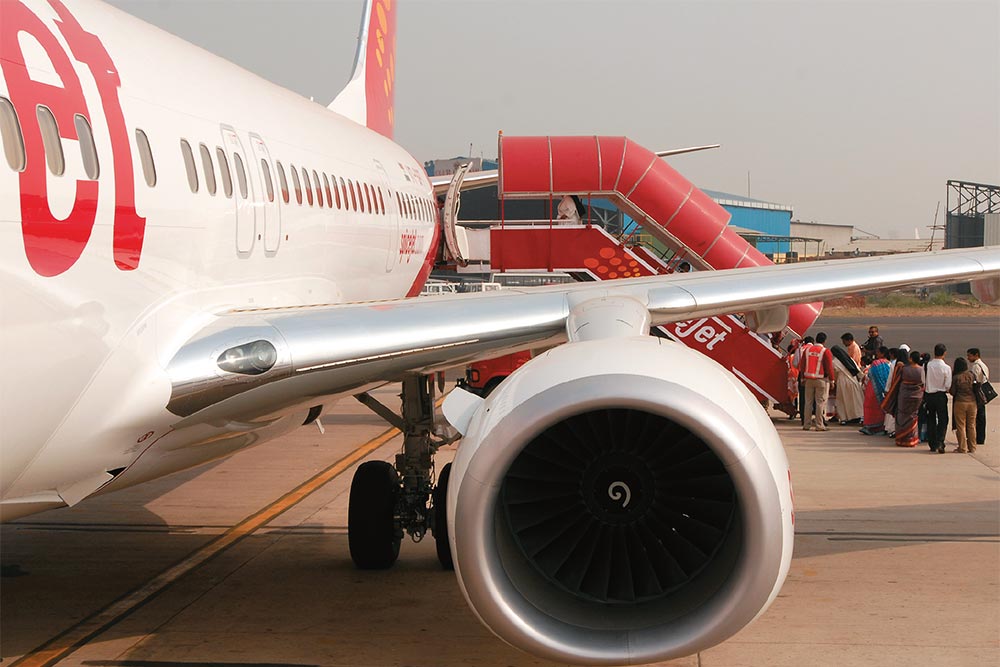Sushil Kumar is triumphant. On January 11, the Delhi-based optician successfully booked seven tickets to Goa for just ₹2,013 each under a promotional scheme by SpiceJet. He was one of 700,000 people who were able to buy tickets during the 72-hour offer that saw the airline’s site as well as online travel websites repeatedly hang, unable to handle the traffic. “Airfares were prohibitively expensive earlier and travelling by train would have meant shutting my store for three more days,” says Kumar. “This was a very welcome surprise.”
Not for other players in the airlines business. Since the grounding of Kingfisher Airlines and the resultant shortage of airline seats, airfares have been going in only one direction, up. So, SpiceJet’s decision to offer 1 million tickets at this low, all-inclusive price for travel in the lean season (between February and April) caught the industry unaware. Reportedly, the Directorate General of Civil Aviation (DGCA) stepped in to prevent a fare war by asking other airlines to avoid similar price cuts. They agreed at the time — terming SpiceJet’s move “suicidal” and “absurd” — but are now in the market with their own versions of cheap tickets. While Jet Airways is offering 30-day advance bookings starting from ₹2,320 to ₹3,200 in some sectors under a LoFares scheme, Go Air launched a similar initiative with fares starting at ₹2,320. Meanwhile, Indigo has low introductory fares to Dubai from Mumbai. Naturally, no airline accepts that its offers are a reaction to the SpiceJet move. “We want to help people enlarge their business, to visit their families more frequently, to provide them opportunities to enjoy holidays,” gushes Giorgio De Roni, CEO, Go Air.
But is it really a good idea for airlines to keep fares low? Almost all airlines are bleeding and SpiceJet returned to profitability only in Q3FY13. “It will be sustainable only if you do it smartly on a year-round basis for revenue optimisation, not if you create artificial demand once a year for revenue maximisation,” says Rajesh Magow, chief operating officer, MakeMyTrip.
There is a certain logic in dropping fares — air traffic has been falling since May 2012, for the first time since 2009, and a short-term offer could encourage new passengers to try out an airline. “It helps in ensuring a certain capacity in advance and in winning marketshare,” says Dheeraj Mathur, national aerospace and defence leader, PricewaterhouseCoopers. Certainly, offers like these offer some tangible benefits — rise in traffic, repeat customers, top of mind recall. “But these may be shortlived in the case of bumper schemes. Price-offs have to be done route by route and flight by flight,” says Magow.
And not at the cost of the bottomline. “If you are paying people to fly, it is unsustainable. It will hurt everyone,” warns Mathur. Indeed, even the DGCA’s argument against knee-jerk reactions by other airlines to SpiceJet’s offer was that new passengers wouldn’t necessarily avail of the offer — the regulator cautioned that it would be regular flyers who would jump at the opportunity and airlines would be depriving themselves of passengers who would otherwise have paid full fare.
As it is, airlines in India have to deal with a challenging environment with high taxes on fuel, airport charges and so on, as well as the price sensitivity of the Indian traveller. De Roni doesn’t believe Go’s low fare schemes are unsustainable but agrees that there are issues. “The challenge is that any increase in cost due to third parties [such as fuel, taxes, airports, etc.] must be transferred to the final customers who, at the end, suffer due to the inefficiencies of the system. The industry overall needs a revision of the framework within which airlines operate,” he says.
So, when can low-fare offers work? When there is true, real-time pricing. Give tickets cheap when a flight is leaving in four hours and occupancy is low, suggests Mathur. Meanwhile, SpiceJet CEO Neil Mills is unapologetic about setting the market on its ears. Speaking with a business daily recently, he said, “We are selling capacity we had not expected to sell. Yes, other competitors would be uncomfortable with what we have done, but so what?”











